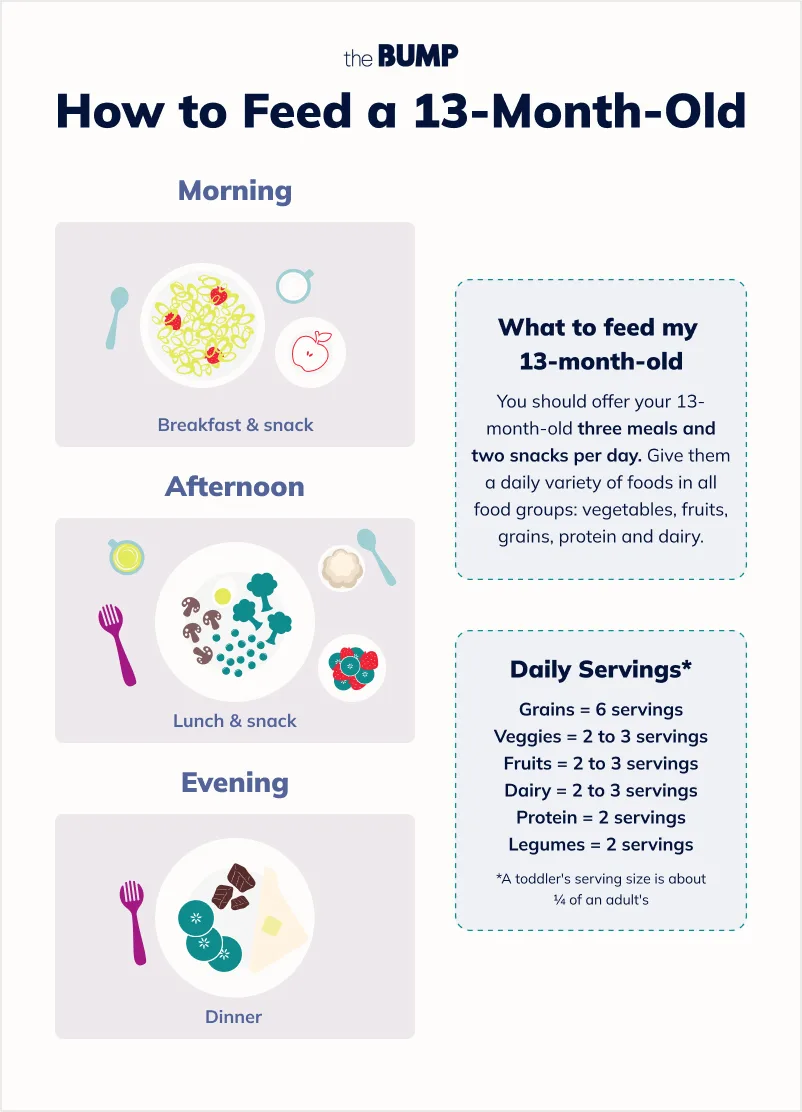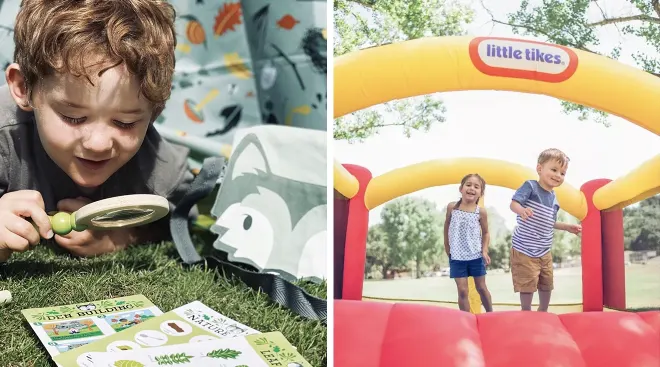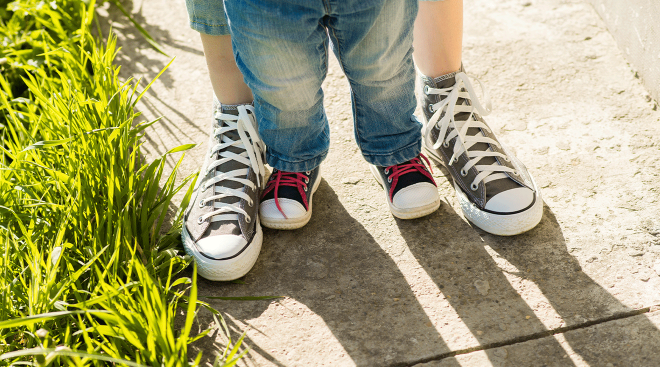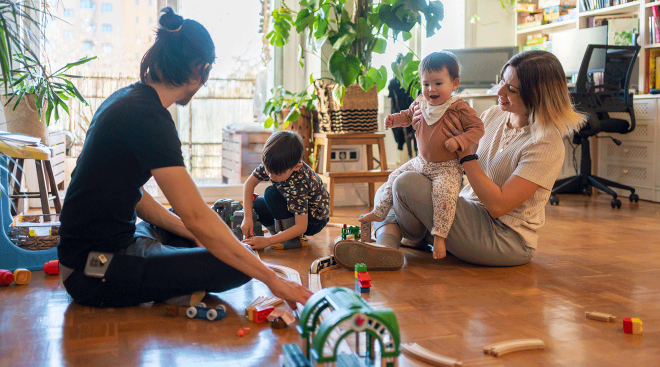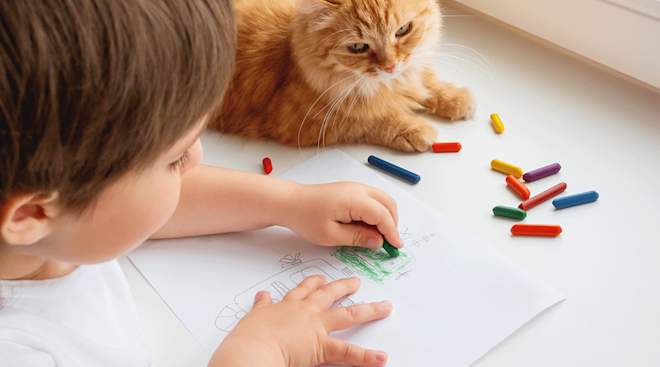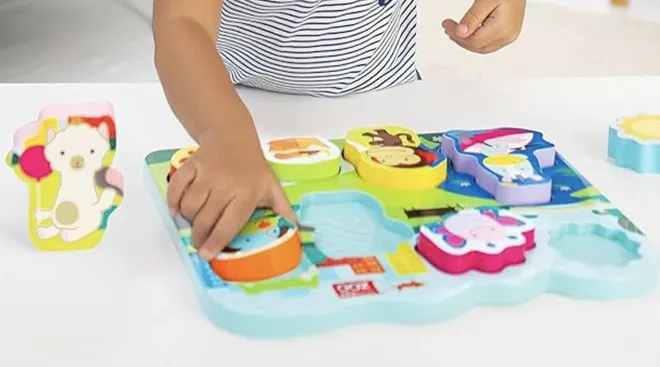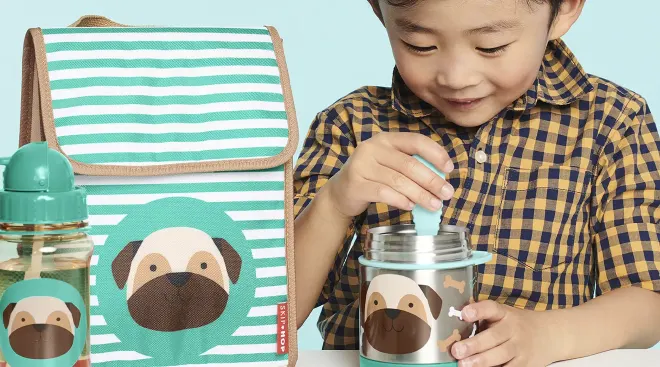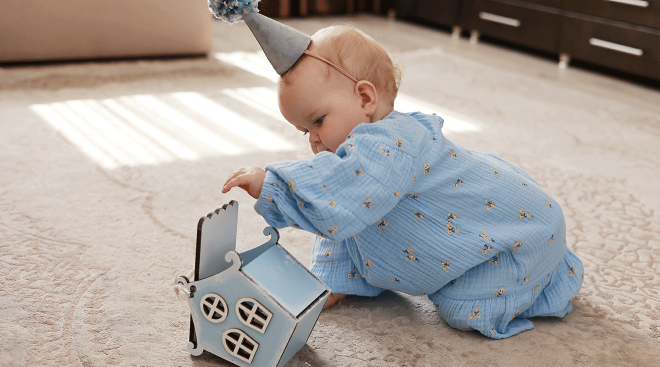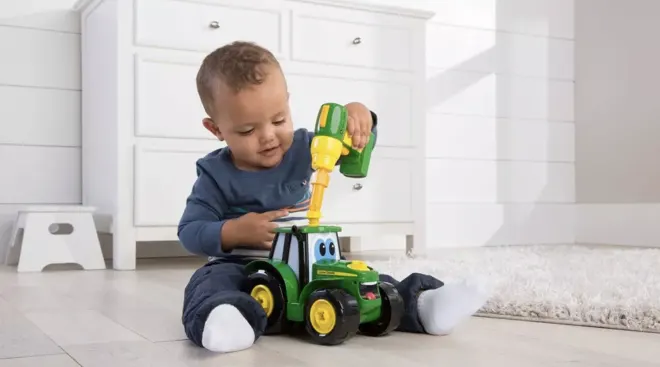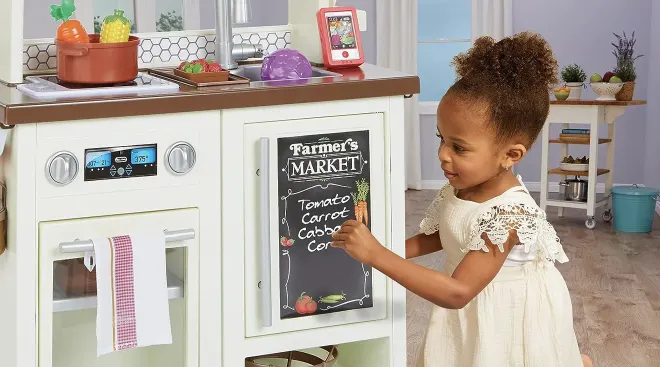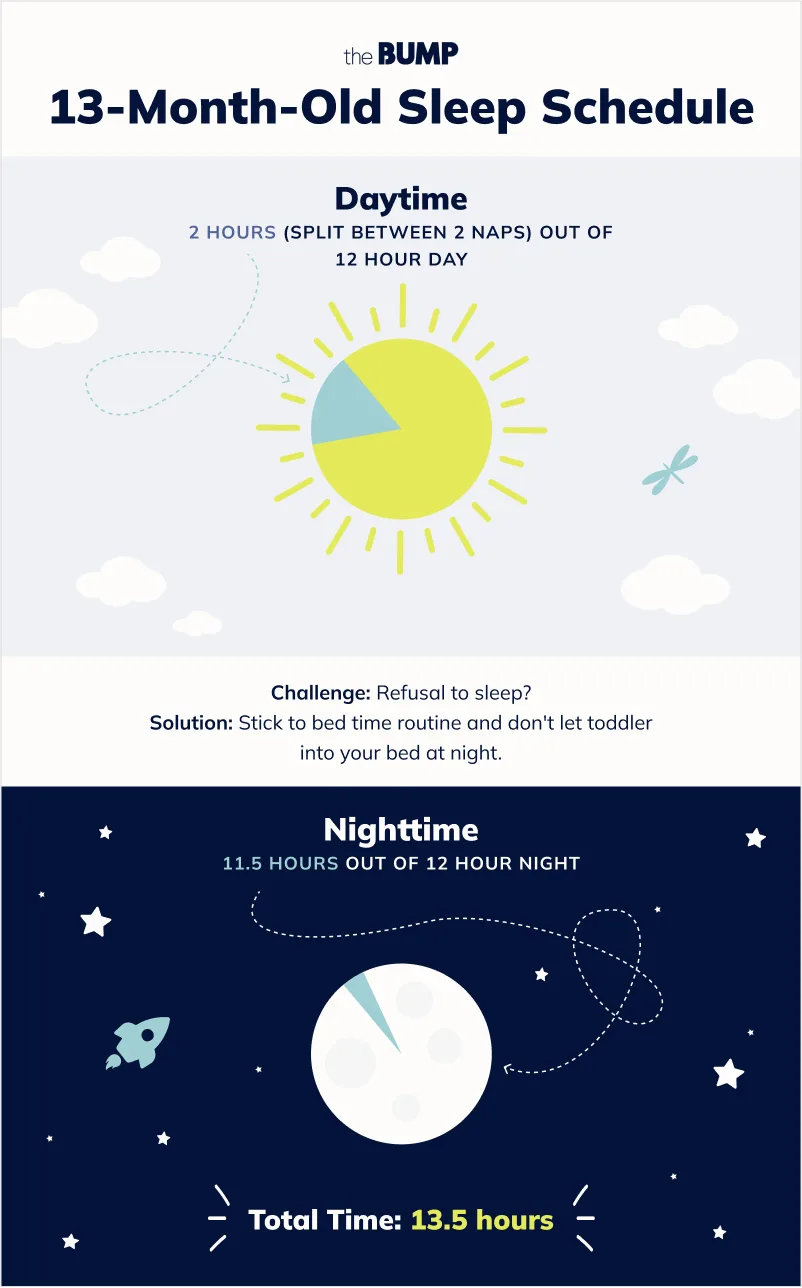Toddlerhood has arrived. That means mealtime messes, new words (like “NO!”), squirmy diaper changes and mood swings. (In case you haven’t heard, some parents are surprised because one can feel like a preview of the “terrible twos.”)
Don't get us wrong—there are plenty of positives to this new phase with exciting 13-month-old milestones ahead. Get ready for spontaneous affection (unsolicited wet and sloppy kisses!) and a sneak peek at your child’s developing personality. Is your 13-month-old baby on the move and working on their words? You have a lot to look forward to.
As your 13-month-old becomes more and more upwardly mobile, you might begin to notice rolls of pudge slowly starting to disappear from arms and legs and weight gain slowing down.
13-month-old weight and height
How much should a 13-month-old baby weigh and measure? According to the World Health Organization, the average weight of a 13-month-old is 20.2 pounds for girls and 21.8 pounds for boys. Average height is 29.6 inches for girls and 30.3 inches for boys. Of course, every kid is different and—just like in babyhood—it isn't the number on the scale itself that's important. It's that your child is gaining weight and growing in a healthy way that’s reflected in a positive curve on the growth chart.
This month, your child should have gained about half a pound and about half an inch or so. If you have any concerns your child isn't growing appropriately, talk to your pediatrician. Otherwise, weight and height will get checked at the 15-month checkup.
13-month-old milestones
Here are some of the 13-month-old milestones your child may have hit or may be working on:
- A lot of parents ask, “Should my 13-month-old be talking?” Yes, but it may not sound like real words just yet. Your toddler may be using the same babble sound —"ba" for bottle,"da" for "dada" or even "cak" for jacket for example—and that counts as talking. Some 13-month-olds are still using gibberish that has tones and a cadence like real conversation but doesn't consist of any actual words. That's normal too. At this age, your little one also understands a lot of what you’re saying—even if they don’t have words in their own arsenal yet.
- Another common question parents have is, “How many words should a 13-month-old say?” Most 12- to 13-month-olds can say one word and about half of them say two words.
- Your 13-month-old is getting better at communicating without having to cry. They’re probably not doing that all the time, but many times, they find ways to get their point across—for example, by pointing to what they want on the kitchen counter.
- Does a 13-month-old baby understand “no”? Yes! A 13-month-old should understand and respond to the word “no.” You’ll be able to indicate that you don’t want your child to do things with a word now rather than simply distracting or redirecting them. That doesn’t mean your little one will like hearing the word “no” though or that that’ll listen to you. That said, your child may like telling you “no” whenever it suits their fancy.
- Should a 13-month-old be walking? Most toddlers can pull themselves up to a standing position and can cruise around the room while using furniture. About half can take a few wobbly steps on their own. (Wow!) Worried because your toddler isn’t walking yet? Be careful what you wish for! Baby’s develop on a range—and even some perfectly healthy tots don’t walk until they’re 18 months old, so try to enjoy their pre-walking days while they last. (You’ll be chasing your tot around before you know it.)
What should a 13-month-old be able to do?
A 13-month-old baby will be able to do all sorts of exciting new things. You’ll hear more and more babbling as your little one mimics the way you speak, and real words will emerge soon too. Your toddler should be able to respond to simple directions like, “sit down,” and use hand movements to indicate preference (pointing or reaching up when they want to be picked up). At this age, some toddlers walk and some don’t, so try not to worry if this is one of the 13-month-old milestones your child hasn’t reached yet.
Does it seem like your sweet little baby has morphed into a difficult creature? Well, that's one of the challenges of toddlerhood. Difficult behavior can be frustrating for you but can be resolved with a little know-how and tons of patience. These articles can help you deal with a few common 13-month-old behaviors:
Do 13-month-olds throw tantrums? Sorry, but yes. Tantrums are one of the less enjoyable 13-month-old milestones you’ll come to face. Tantrums are pretty common starting at about the 12-month mark. Your toddler may not be able to adequately communicate what they want or how they feel, and that’s frustrating for them. These behavioral outbursts can get even more intense when your little one is hungry, tired or sick. Deep breath; it’s best to keep your cool in the heat of a 13-month tantrum. Start practicing your response to a toddler’s tantruming because these fits will likely stick around for a bit. Try not to yell, point your finger, laugh or get upset; these reactions might actually encourage these behaviors. It’s always best to praise good behaviors; positive reinforcement tends to be more effective.
Now that you've passed the one-year mark, you're probably feeling much more confident in your ability to care for a sick child than you were a year ago. But there are always new issues or concerns that crop up. Some common health questions parents of 13-month-olds have are:
- My 13-month-old has diarrhea. What should I do?
- My 13-month-old has constipation. What should I do?
- My 13-month-old is throwing up. What should I do?
- My 13-month-old has a fever. What should I do?
At 13 months, your now toddler is slowly transitioning away from baby food, the bottle and/or formula. But remember, they’re still learning all these new things, so it's okay to make the switch slowly.
How much should a 13-month-old eat?
Doctors say most toddlers need approximately 1,000 calories per day—give or take—or about 40 calories for each inch of their height. But trying to count your kid's calories isn’t practical. You can't expect a 13-month-old to eat the same-sized portions from one meal to the next—or the same amount of food from one day to the next. Heck, don't expect your kid to even touch the same food they devoured yesterday!
Offer your one-year-old portions about one-fourth the size of an adult portion. Then, let them choose how much they eat based on their appetite. Thirteen-month-olds are notoriously finicky, and some days may seem ravenous—and other days seem to live off a handful of cheddar bunny crackers and nothing else.
What to feed a 13-month-old
You should offer your 13-month-old three meals and two snacks per day. Give them a daily variety of foods in all food groups: vegetables, fruits, grains, protein and dairy.
Need food ideas for a 13-month-old? Toddlers tend to get too little calcium, iron and fiber. In addition to dairy products, your child can get calcium from foods such as green leafy veggies, broccoli and tofu. Tofu can provide iron too, as can fortified cereal, dried peaches and lean ground beef. For fiber, you may offer pinto or refried beans, prunes, bananas and whole wheat pasta.
It's okay to continue to feed your 13-month-old baby food, if they still like it; on-the-go pouches are fine from time to time. Ideally, you want them eating table food and practicing good oral motor development.
How much milk should a 13-month-old drink?
How much milk your child should drink depends on how much other calcium is in your child's diet. That said, it’s recommended that they don’t drink more than 16 to 24 ounces of milk a day.
Most 13-month-olds should be drinking whole milk, since one-year-olds need the fat for brain development. At 2, speak to your pediatrician about whether you should switch them to a lower percentage milk. Doctors recommend kids up to 3, get 700 mg of calcium per day. So if your kid doesn't get calcium from any other source, they'll need about three 8-ounce cups of milk per day. If they get calcium from other sources, you can adjust their milk intake accordingly.
If you're breastfeeding, you don't have to offer your child cow's milk but you certainly can. Just keep an eye on your tot's growth to make sure your toddler is gaining a healthy amount of weight at each checkup. Some moms choose to wean their toddler off breastfeeding after their first birthday but there's no reason not to continue if you two want to keep it up!
Juice is okay occasionally, but it should be unsweetened 100 percent fruit juice and should be limited to a maximum of 4 ounces per day.
You should continue to wean your toddler off the bottle if you haven't already. At this point, your child should be using a regular cup or a cup with a straw as much as possible. Some doctors don't love the sippy cup because its use (with milk or juice) could lead to tooth decay and it could inhibit speech development in some children.
13-month-old won’t eat
Now that your child's growth is slowing down and they’re getting more independent, you might find them refusing to eat more often than they used to. You can't and really shouldn't force your child to eat—but you should keep offering a variety of healthy foods and as many unprocessed foods as possible. Here's more great advice on how to deal with picky eating.
If your child won't eat anything at all, it could be a sign of illness, and you should call the pediatrician immediately.
13-month-old feeding schedule
A toddler's serving size is about ¼ of an adult's
You've probably found that your 13-month-old is pretty settled into a daily sleep routine—though little things, like illness, teething and streaks of independence can sometimes throw the routine for a loop.
How much sleep does a 13-month-old need?
It's recommended that kids this age get 11 to 14 hours of sleep total in a 24-hour day. Some 13-month-olds are still taking two naps per day and others are starting to transition to just one nap (usually by 18 months), so how those hours are broken up depends on your own kid's schedule.
13-month-old refusing to sleep
Your 13-month-old won’t sleep? We're not surprised. At this age, it's normal for a child to use every trick in the book to try to delay going to bed—getting another cup of water, needing to find a special toy right now, reading what seems like 20 books… and on and on.
Stick to the same calming bedtime routine—and start it at the same time each night. Make your child's room comfy. Try to cut down on trips to your child's room and/or don't let your child come into your bed in the middle of the night. (If they do, bring them back to their own bed immediately.) All these strategies can establish nighttime rules and promote a good night's sleep for a toddler (and for you.)
13-month-old sleep regression
If your child used to sleep well at night and then suddenly won't, it could be due to at least one of several things. At this age, they may begin experiencing active dreams that can suddenly awaken them. Teething pains could also be waking your child in the middle of the night. Follow the bedtime routine and be patient, and your kid will likely soon get back to sleeping through the night.
Transitioning to a toddler bed
If your 13-month-old is still sleeping in a crib, there's absolutely no rush to move them out of it until around 18 months or nighttime potty training—unless, of course, it poses a safety issue. Once a child can climb out of the crib and there's a risk of falling, you'll want to make the switch sooner rather than later. You’ll have the added challenge of teaching your little one to actually stay in their toddler bed at night, but you’ll get there.
13-month-old sleep schedule
Here's one example of how it might go:
Many 13-month-olds are starting to get interested in playing games and mimicking their parents as they do household chores. You might even have a budding artist on your hands! Some fun activities, games and toys for 13-month-old include:
- Peek-a-boo. Some 13-month-olds can start to play along with this fun and classic game.
- Beginner's coloring. Give your child some chunky crayons and encourage them to scribble on paper
- Pass the ball. Roll your 13-month-old a ball and see if they’ll roll it back!
- Do chores together. They may see you sweep the floor or wipe the countertop and want to help. Let them join in! This is a great way to establish helpful habits from the get-go.
- Buy your tot good shoes. The fit, support and lack of blisters are worth the money, especially for your new walker. Trust us.
- Set aside at least 5 to 10 minutes a day to read books together with your 13-month-old. This is a calming bedtime routine and a great way to learn and bond.
- Do another safety check of your home. Make sure it's been baby-proofed for a walker!
- Schedule your tot’s 15-month checkup if you haven't already.
- Help prevent tantrums. Your toddler is cranky when they’re tired or hungry. Try not to miss the nap window and don’t be late for meals. When a tantrum starts, stay as calm as you can. Make sure your tot is safe, but don’t bribe your 13-month-old or give into their demands, as it’ll only reinforce their naughty behavior.
- Narrate your day. Talking through activities with your 13-month-old baby can help them learn and encourage speech and language development. You can also start using pictures to teach new concepts too.
Your 13-month-old is a wild child. They’re full of personality and big ideas! The world is a big, exciting place for your toddler. Enjoy watching your cutie learn, grow and explore. Raising a “big kid” is hard work, but it’s so rewarding too!
Please note: The Bump and the materials and information it contains are not intended to, and do not constitute, medical or other health advice or diagnosis and should not be used as such. You should always consult with a qualified physician or health professional about your specific circumstances.
Navigate forward to interact with the calendar and select a date. Press the question mark key to get the keyboard shortcuts for changing dates.


































